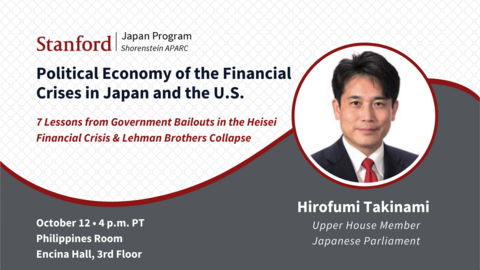Political Economy of the Financial Crises in Japan and the U.S. : 7 Lessons from Government Bailouts in the Heisei Financial Crisis & Lehman Brothers Collapse
Political Economy of the Financial Crises in Japan and the U.S. : 7 Lessons from Government Bailouts in the Heisei Financial Crisis & Lehman Brothers Collapse
Thursday, October 12, 20234:00 PM - 5:00 PM (Pacific)
Encina Hall, Third Floor, Central, C330
616 Jane Stanford Way, Stanford, CA 94305

This spring, we saw the collapses of Silicon Valley Bank, Credit Suisse, etc., and now we are observing collapses of Chinese real estate giants: Evergrande, and Country Garden. Would be there another financial crisis?
Now, it is highly worthy to review the ‘lessons' of historically recent financial crises with significant seriousness, which happened in the two largest economies, the United States and Japan.
During the 1990s-2000s, Japan and the United States each experienced the same type of financial crisis, notably triggered by the collapse of major financial institutions, stemming from the real estate bubble burst. Namely, the Heisei Financial Crisis and the Lehman Brothers Collapse.
Both were under the political-economic conditions of one of the largest economies in the world, as well as of an advanced democracy. Enormous shock happened politically, economically, and historically, due to these two financial crises.
Then, as the research question, what were the ‘lessons’ of the United States and Japan's financial crises, concerning crisis response through public money injection, from the viewpoint of political economy? Where is the ‘learning’ between Japan and the United States?
Also, as the related research ‘puzzle’, why the difference in speed between these countries to respond and recover?
Based on his Ph.D. thesis, Senator Takinami, an alumnus of Stanford APARC, will elaborate on these issues by covering up and amending Hoshi & Kashyap(2010), thus establishing ‘7 lessons’ throughout the Japan and the United States financial crises on government bailout from the political economy viewpoint.
Speaker

Hirofumi Takinami (Ph.D.) is an Upper House Member of the Japanese Parliament, corresponding to a Senator in the U.S. He is a former Vice-Minister of Economy, Trade, and Industry, and also a former Vising Scholar, APARC, Stanford University.
Dr. Takinami covers a wide range of policies, including not only energy, environment, and finance, but also innovation, infrastructure, welfare for the disabled, etc. He has been the Director of the Fisheries Division of LDP (Liberal Democratic Party) from last year.
Before starting his political career 10 years ago, he was a Director of the Ministry of Finance. During his about 20 years of service as a Japanese government official, he held management positions including Public Relations Director, and Deputy Budget Examiner at the Ministry of Finance. He also worked internationally, in charge of the Asia-Pacific Economic Cooperation (APEC) and the Asia Europe Meeting (ASEM) etc.
He graduated from the University of Tokyo in 1994, earning a Bachelor of Law. He received a Master of Public Policy (MPP) from the University of Chicago in 1998. While in office as an upper house member, he obtained a Ph.D. in 2021 from Waseda University for the study on financial crises, which he started when he held research positions at Stanford University as a Visiting Fellow in 2009-2011 and as a Visiting Scholar in 2016.
